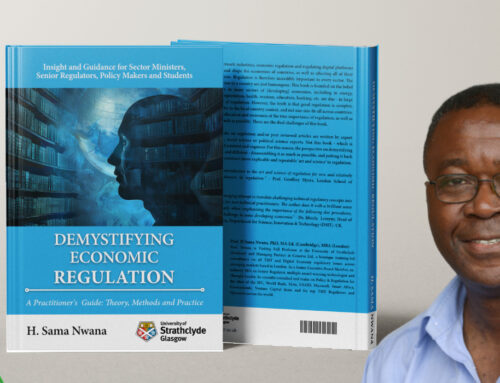Cenerva’s Prof H Sama Nwana leads a High-Level Digital Economy Policy & Regulatory Training and Capacity Building Workshop in Ghana. Initiated by the Ministry of Communications & Digitalisation (MOCD) and sponsored by Smart Africa Digital Academy (SADA), this successful workshop concludes in Accra with clear recommendations on accelerating the emerging Digital Economy in Ghana.
The digitisation of services is affecting virtually all parts of the economy in Ghana – particularly how Ghanaians pay for services using mobile money, work, study, innovate, shop, socialise, and access government services.
The emerging digital economy is resulting in the emergence of new business models and changing the way existing businesses operate. In this rapidly evolving digital economy, effective regulation is critical to ensure that consumers are protected, competition is fostered, and innovation is encouraged.
Policy-makers and regulators must keep pace with the ever-changing digital landscape to ensure that Ghana is an attractive destination for investments in the digital economy.
This workshop provided an excellent opportunity for policy-makers and regulators to better understand the latest developments in the digital economy and consider how best to foster its growth in Ghana.
Smart Africa Director General, Mr Lacina Kone, stated: “In the modern era, digital technology is essential to everyday life and has become embedded in every aspect of our lives, including business and government. Like all countries throughout the world, African countries need to adapt to this reality and ensure that technology becomes a central component of people’s lives and businesses.”

The workshop was facilitated by Cenerva, a leading international consulting firm specialising in technology, media, and telecommunications. Attendees comprised senior representatives from a range of government departments and agencies.
This three-day programme allowed for an in-depth exploration of the topics surrounding the digital economy and addressing the challenges and opportunities associated with developing this sector of the economy in Ghana.
Topics covered included:
- An exploration of the differences between the Fourth Industrial Revolution and the narrower scope Digital Economy
- The difference between the offline ICT/TMT Sector and the online digital economy sector
- Identification of key digital economy concepts using the tool of the Internet Value Chain (IVC); trends, opportunities, and challenges faced globally and more specifically by African countries (see diagram below)
- Positive and negative externalities associated with the digital economy and how these can be addressed through policy and regulation
- How to start designing “fit-for-purpose” policy, legal and regulatory frameworks for the digital economy in Ghana
- The importance of the role of digital financial services, the cashless economy, and approaches to and limitations of taxation
- How to support the digital transformation journey through the development of relevant and appropriate public policies
All of this was underpinned and enhanced by learnings and examples from other nations.

The Digital Economy Requires Three Pillar Platforms:
- 互聯互通平臺(資訊通信技術行業)
- 支付平臺(金融/中央銀行)和
- 身份證明平臺
任何建設數字經濟的國家都需要以下三大支柱平臺作為基礎:
Connectivity Platform: the connectivity platform consists of a combination of fixed broadband, mobile broadband, mobile narrowband and voice/SMS/USSD. Connectivity to a large proportion of citizens is essential for inclusion and a prosperous digital economy.
Payment Platform: this core platform consists of a combination of credit cards, bank accounts and mobile money. Without a wide-scale payments platform or payment gateways, there can be no real Digital Economy.
身份(ID)平臺: ID平臺是公民平臺,國民ID,駕駛執照和/或唯一的移動/蜂窩號碼的組合。其目的是建立一個清晰的身份識別計劃,確保一個國家中的每個公民都有一個單一的身份,無論他們可能持有多少個銀行帳戶,他們可能擁有多少張SIM卡,他們可能持有多少張信用卡等。

Digital Economy to be a Top 5% Government-led Project in Ghana
The workshop identified the need for a number of specific areas to be reviewed, particularly around the Ghana Digital Economy Policy, which is currently being drafted, along with a strategic review of taxation and regulatory policy for areas such as Over-the-Top (OTT) services and artificial intelligence.
Critical to progress in Ghana’s digital transformation are several non-MOCD institutions, including the National Identification Authority (NIA), Bank of Ghana (BoG), Ghana Standards Authority (GSA), and the National Media Commission (NMC). The Workshop noted the importance of bringing all these stakeholders together to develop a more holistic and integrated approach.
Finally, the workshop identified some legislation gaps and outdated legislation which need addressing for the Digital Economy. There is an urgent need to review, harmonise and make proposals on legislation updates and creation; this will require alignment with existing e-Transform activities.
Across all of this, facilitating change management is essential. In addition, effective communication and collaboration will help coordinate initiatives and support information sharing.
And above all, it has to be adequately and appropriately resourced.
How Cenerva can Support Your Journey
As well as providing bespoke consultancy to developing nations on regulatory policy and development of the digital economy, Cenerva’s renowned TRMC programmes now include the Executive Digital Economy Master Class.
This programme is specifically designed for senior executives with experience in the sector or as a follow-up to the Cenerva ICC Regulatory TRMC for those seeking an advanced knowledge.
This Executive Digital Economy TRMC programme has been developed to provide a comprehensive understanding of critical issues in this fast-moving and increasingly complex sector.
In addition, for those interested in learning more on this topic, Prof Nwana’s book – The Internet Value Chain and The Digital Economy – explores, in-depth, the key policy considerations for the digital economy and offers recommendations on potential solutions for policy-makers and regulators to help develop a balanced, efficient, and coordinated approach in regulating a complex environment.
國際5G新聞服務
及時瞭解世界各地有關5G發展的最新消息。通過訂閱我們的電子郵件服務,將其直接發送到您的收件匣。





